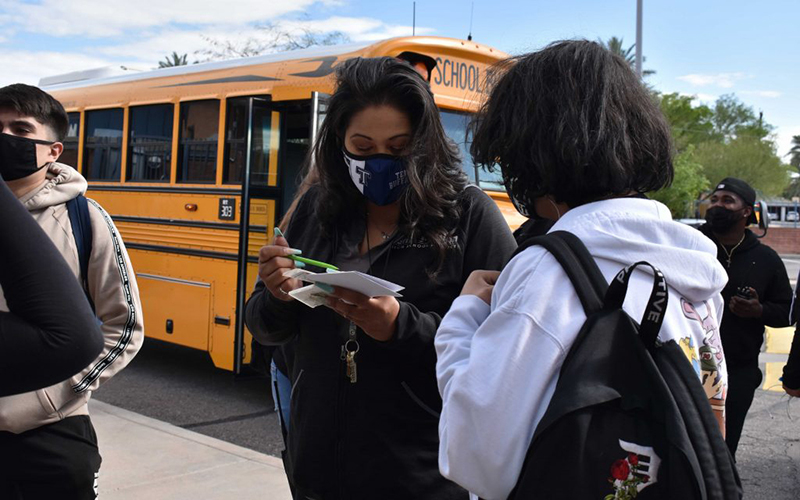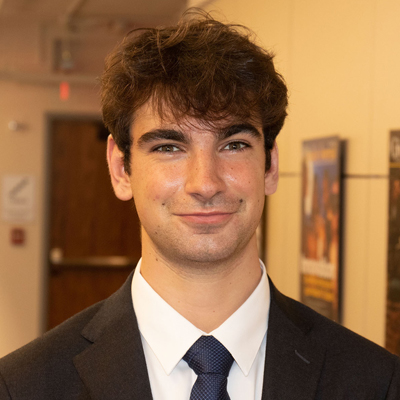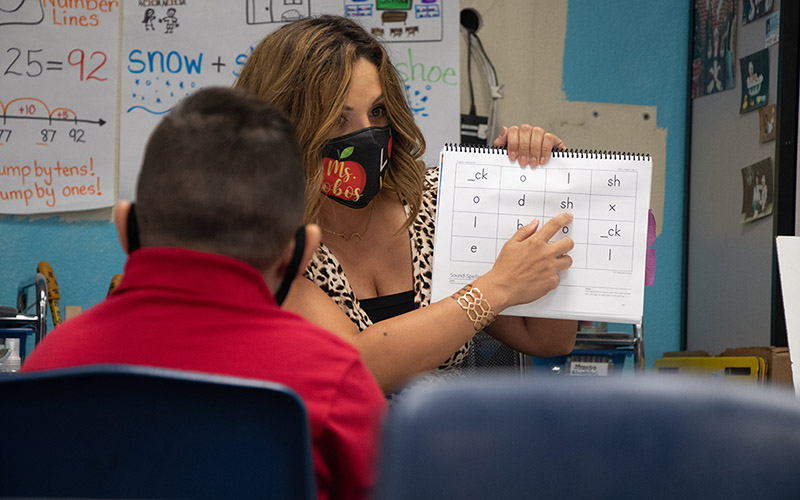WASHINGTON – The Arizona Supreme Court ruled Tuesday that state lawmakers could not include a ban on school mask mandates and other issues – everything from voter registration to dog-racing permits – that were rolled together in budget bills.
The one-line order from the court upholds a September Superior Court ruling that said the Legislature violated the single-subject requirement of the Arizona Constitution by “log-rolling” unrelated measures in budget reconciliation bills, or BRBs.
That ruling meant parts of four BRBs were invalid, including a section in one that would have denied state funding to schools that imposed mask mandates.
Tuesday’s ruling is “nothing more than simple commonsense precautions to protect children and young adults from COVID-19,” said Dr. Sean Elliott, medical director of infectious diseases and immunizations for the Arizona Chapter of the American Academy of Pediatrics.
Calls seeking comment from Gov. Doug Ducey and Attorney General Mark Brnovich, whose office argued unsuccessfully to keep the mask ban and other policies in the BRBs, were not immediately returned.
But the court’s order was welcomed as a “huge win for Arizona students and voters” by Rep. Reginald Bolding, D-Phoenix, the House minority leader, who said it is also “a win for the legislative process.”
That was echoed by Will Humble, executive director of the Arizona Public Health Association, who said state lawmakers have “been playing this game for the last 15 years, at least, where they put things into the budget reconciliation bill that are not in the title or not related to the subject of the bill.”
“They’ve always gotten away with it because nothing ever rose to the level like this, where stakeholders put the resources to do a full-blown court challenge,” Humble said.
That challenge was mounted by the Arizona School Boards Association and other groups that claimed lawmakers violated the state constitution by packing four budget reconciliation bills with dozens of policy changes that were not related to the budget. Those bills dealt with the budgets for health, K-12 education, higher education and “state budget procedures.”
Included in those bills was language that would have prohibited school mask mandates for students or staff, banned vaccination requirements for teachers and barred state universities from requiring students to be vaccinated, masked or tested for COVID-19.
But the COVID-19 restrictions were not the only policy directives inserted into the BRBs. The bills would prohibit the teaching of critical race theory in state schools, open access to voter registration databases for federal elections, ban local pandemic-related curfews, set rules for terminating condo agreements and dog-race permits, and affect practices of social media platforms relating to political contributions.
The state argued that all of those subjects were connected to the budget bills they were included in, but Maricopa Superior Court Judge Katherine Cooper disagreed in a Sept. 22 ruling that overturned those policies for violating the single-subject rule.
“No matter how liberally one construes the concept of ‘subject’ for the single subject rule, the array of provisions are in no way related to nor connected with each other or to an identifiable ‘budget procedure,'” Cooper wrote. “The bill is classic logrolling – a medley of special interests cobbled together to force a vote for all or none.”
On appeal, Arizona Solicitor General Beau Roysden argued that the titles of the bills did inform “someone who’s reasonably knowledgeable” about the budget of what was contained in them. It’s the Legislature’s job to decide if the subjects relate to the title and not the court’s, he said.
The justices seemed to be struggling with the concept of where to draw the line for what can be included in a reconciliation bill. But Chief Justice Robert said at the beginning of Tuesday’s hearing that there was a “considerable degree of unanimity on this case” among the justices.

A letter signed by more than 1,000 health professionals in Maricopa County said schools without mask mandates are twice as likely to have a COVID-19 outbreak than those that require universal masking. (File photo by Kelly Richmond/Cronkite News)
He said the consensus was that the bills do violate the single subject rule, and he told the attorneys “you might want to spend some time talking about remedies, how we address this going forward.”
Within hours of the hearing, the court had issued its order upholding Cooper’s ruling. The order said the justices did not agree with the “trial court’s reasoning in its entirety,” but that it did uphold her decision and would issue a full opinion at a later date.
Despite the brevity of the order, Humble called it “super important case law for the future” of Arizona. He said he hopes the court’s full opinion will “go even further.”
“By going further, I mean give more guardrails to the people, and put more guardrails on the Legislature when it comes to implementing the single title and single subject prevision of the constitution,” he said.
For now, said a statement from Arizona House Democrats, the order means “Arizona public school students, teachers and staff will be better protected from COVID-19 because school boards can take necessary measures to protect them without politicized anti-science interference from the government and Republican lawmakers.”
Elliott said that he hopes Ducey will realize that “several legal bodies have determined his actions were unconstitutional and I hope he can listen to the science in support of mask mandates and also supporting vaccines for others.”
“If so, then he’ll be taking great steps to support the health of his constituents,” Elliott said.



